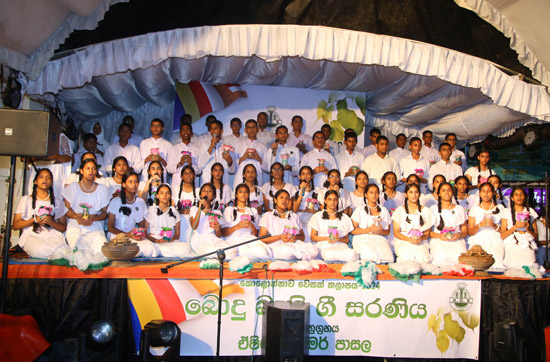Beginnings of Bakthi Gee and its continuing tradition
“Poya sande sanda kiranin, lowe andura duru wewa”
‘From the light illuminating from the full moon, may the darkness in the world heal’- this line from the well-known song, “Poya Sande Sanda Kiranin” captures a very familiar Buddhist wish through one simple line. Through our own light and power, may we be able to take away the evil and darkness in the world and aim to make it a better place for all.
Poson Poya marks a special moment in the history of our country, for it is the day that Buddhism was brought to Sri Lanka through Arahat Mahinda to King Devanampiyatissa, who ruled in Anuradhapura at the time. However, centuries later, with colonization and the introduction of new religions to the country that led to the decline of Buddhist culture, there was a necessity to revive it.

Schoolchildren perform Bakthi Gee during Vesak. Pic by Eshan Fernando
With the revival came Bakthi Gee (Buddhist songs of devotion) that we have become familiar with at different stages of our lives; as school children dressed in white and carrying a lotus flower or lamps during the annual June performance, or hearing the familiar tunes from the loudspeakers from the pandals that decorate the streets. Beginning with songs like “Wadi Sugande” and “Meth Mal Pibideva” to “Paramitha Bala” and “Budhdhanubavena”, there is a vast range of Bakthi Gee being sung by Buddhists throughout the country in celebration of the Poson Poya.
The Bakthi Gee tradition is a simple yet effective way of drawing the younger generation closer to their religion. Songs such as “Uththama Muni Dalada” depict the story of how the Sacred Tooth Relic was brought to Sri Lanka, bringing out how music also educates us about our rich history.
Bakthi Gee began as a response to Christian influence, according to Professor Asanga Tilakaratne, Professor of Pali and Buddhist Studies. In the latter part of the 19th century, Christian hymns and carols were becoming known to people. This led to the creation of Bakthi Gee that would commemorate primarily Vesak and Poson.
With Bakthi Gee being written at a time where the revival of Buddhism was uppermost, much emphasis was given to the lyrics with the purpose of imparting Buddhism to the people and based on connected themes of highlighting the Buddha, Dhamma (teachings) and the Sangha (community of monks).
Bakthi Gee is a rare celebration of religion, a contrast to ‘gatha’. But as Prof. Tilakaratne states, there is a strong ‘balance’ between aesthetics and philosophy that is provided by devotional songs to the people. People obtain aesthetic fulfillment through the music, and its popularity shows just how much it is appreciated. The intellectual fulfillment of the people comes from Buddhist philosophy itself. Since everyone has their own path and cannot follow Buddhism in the same way, Bakthi Gee is an important and cohesive way to bind people together through the universal language of music, to be shared and enjoyed by all.
These classical songs have now become well integrated into our cultural identity as Buddhists, Prof. Tilakaratne says. Written at a time of necessity, they were passed down through generations who felt a deep connection to their religion, and wanted to ensure that it would reach their children. The pride felt in this tradition is evident in the temples that still play this music and the programmes conducted by the public.
This tradition has continued through well known Sri Lankan singers such as W.D. Amaradewa, Nanda Malini and others. Rohana Weerasinghe, the composer of famous songs such as “Nidu Kanane” sung by Sunil Edirisinghe, and “Pansale Bo Maluwe” sung by Nanda Malini, however feels that the interest of the younger generation in Buddhist music has decreased. He recalls how during the gramophone period, ‘Budhuguna Geetha’- songs expressing the qualities of Buddha, were very common. This type of music is very valuable but is on the decline. It is the responsibility of the youth to understand their value and popularize these songs again, he believes.
Jagath Wickremasinghe, the singer of his own Bakthi Gee such as “Lovthura Budu Vee”, “Perum Puranawa” and “Pahansila Dalvila”, with over a hundred Buddhist songs, tells us the dynamics of this music is changing with the times. With the deterioration in societal values and the lack of connection some Buddhists have to the temple, Bakthi Gee with deep meaning and true understanding are not often found.
The interests of people are divided, which hinders the creation of meaningful songs similar to the colourful ones you find in the past, says Jagath, urging the younger generation to engage themselves in the philosophy, see the beauty in the religion, and create music that highlights its practice.
In the ever-changing circumstances of the modern world, it may sometimes be difficult to find hope or comfort. Yet, there are no words to clearly articulate the feeling one gets when lighting an oil lamp at the temple, or looking up at the Bodhi tree with a pot in your hands, the sand between your toes and the wind on your face. The emotions stirred up within you, can also be tapped into through powerful and meaningful music and Bakthi Gee with its mellow tunes can evoke a similar sense of tranquility and pride within the listener.
Two memorable lines of the chorus of “Poya Sande Sanda Kiranin” say it all: “Hade nagena sil suvandin, pave duganda wanaseva” (May the goodness in your heart triumph over the aura of darkness).
Searching for an ideal partner? Find your soul mate on Hitad.lk, Sri Lanka's favourite marriage proposals page. With Hitad.lk matrimonial advertisements you have access to thousands of ads from potential suitors who are looking for someone just like you.


